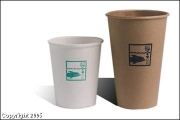A steaming hot cup of coffee seems more likely to inspire scientists than to baffle them. 
But when the Navy requested 20 million paper coffee cups that are decomposable, biodegradable and, most important, won’t burn the hand of the sailor holding it, managers at Clovernook Center for the Blind and scientists at International Paper in Miami Township in Clermont County had to scramble.
“It was a challenge, but we had to meet it,” said Kim Frick, director of sales and marketing at Clovernook.
The center employs workers who are blind and visually impaired to manufacture paper products such as cups, folders and adhesive labels for the government and manufacturers.
Clovernook has partnered with supplier International Paper on specialized projects before, but it took almost a year to come up with a cup that met the Navy’s demands.
They finished the project last month.
“Essentially we had to come up with a cup that had a coating that was FDA approved but could also be tossed overboard into the ocean and not harm sea life or the environment,” Frick said. “It was a combination that really hadn’t been done successfully before.” Neither partner will discuss specifics of the coating compounds for proprietary and patent reasons.
International Paper scientists Christopher Cleveland, Tricia Reighard and Jay Marchman spent months trying to come up with a suitable coating for the cup that would resist the transfer of heat from the hot beverage to the fingers, while also being able to break down safely in the environment. “It was mostly trial and error to see what would work to meet the Navy specifications,” Cleveland said. “We are certainly experts at paper products, but we always have to draw on our experiences and practice what we learn to come up with the right combination.”
20 million cups
Clovernook employs 140 workers at its North College Hill location on Hamilton Avenue and at factories in Dayton, Ohio, and Memphis, Tenn.
The nonprofit organization expects sales of paper products to government and private entities to surpass $7 million this fiscal year, with about half of that coming from file folders and other paper-based office supplies. Proceeds are used to assist blind or visually impaired adults and children in training programs.
Clovernook is also the world’s third-largest producer of Braille magazines and books, with more than 50 million pages generated annually.
Cup sales are expected to come in just under $1 million, Frick said, with the Navy ordering about 20 million cups this year at 5 cents each.
The Navy, which is Clovernook’s largest cup customer, requested last year that the center make its biodegradable cups in larger sizes that stay sturdy longer – part of a push by the U.S. government to only use “green” products, or those that are biodegradable, compostable and eco-friendly.
Using expanded polystyrene beads was not a solution because the beads do not break down in a landfill. Coatings used by most cup manufacturers are made from petroleum-based products, which also didn’t meet the definition of eco-friendly.
IP to the rescue
That’s when Clovernook asked for help from International Paper, the world’s largest paper and forest products company. IP is based in Connecticut, but has a research plant in Miami Township off Interstate 275.
“Without coating, a paper cup will lose form after 15 or 20 minutes and start to soften up,” Frick said. Cleveland and his team applied several manufactured components to samples to see whether the cups would maintain their integrity as well as resist heat transfer and be eco-friendly.
The breakthrough pleased Clovernook president Jeff Brasie, who said his organization has received inquiries about the cups from companies in many parts of the U.S. and Canada.
“Clovernook is one of the pioneers in the manufacture of biodegradable and compostable paper cups,” he said. “More and more companies are seeking environmentally friendly packaging, and with the new International Paper and Clovernook paper cup we can offer customers a superior product that will not contribute to landfill growth.”
Frick said he believes the technology will spur Clovernook’s revenues, which will assist those who are blind or visually impaired with life skills, job and computer training.
“With the push to green products, we think this can open up markets for our products in institutional use such as hospitals and schools,” Frick said. “My feeling is that once we get the word out of what we have, we’ll struggle to meet the demand.”
Another challenge
The new coffee cup already has spurred at least one new customer: the Army called to inquire about getting the same coffee cups for its troops, but in brown instead of white like the Navy’s.
“Apparently a discarded white coffee cup can be picked up on overhead satellite photos, which could put troops at risk,” Frick said. “It’s another challenge, but I think we can meet it.”
Source
Cincinnati Enquirer Feb. 09, 2005.
Share
Renewable Carbon News – Daily Newsletter
Subscribe to our daily email newsletter – the world's leading newsletter on renewable materials and chemicals










